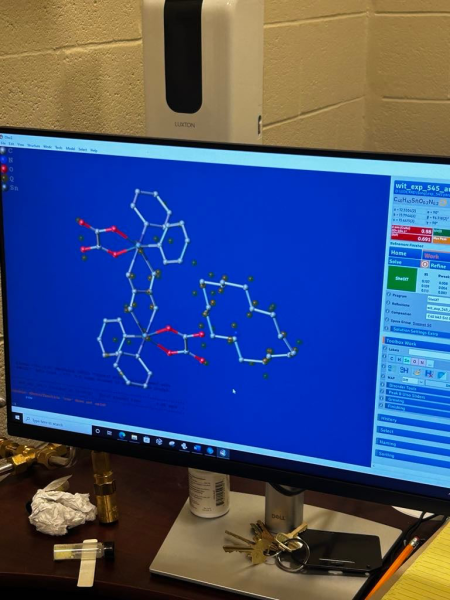Eight Jefferson students were selected as semifinalists for the Regeneron Science Talent Search (STS), a prestigious science and math competition for high school seniors in the United States. Following a highly competitive application process that includes submitting research papers and personal essays, seniors Sanchali Banerjee, Marina Lin, Phoebe Pan, Samvrit Vasudev Rao, Patrick Shi, Jaydon Shuan Sun, Avnith Vijayram and Ray Zhang earned their place among the 300 semifinalists who were announced on Jan. 8. The top 40 finalists will be announced on Jan. 23.
For some students, the first step was reaching out to professors who conducted research that aligned with their interests.
“I would send [the professors] an email describing who I am, what I’ve done and why I wanted to work in their lab. After sending a lot of these emails, I got a response from Dr. Jennifer Kwan at Yale University, who I conducted my research under,” Vijayram said.
After meeting with Dr. Kwan, Vijayram was introduced to the concepts of gene knowledge graphs—a network-based way to organize relationships between genes, their functions and the pathways they are associated with—and many other techniques that were relevant to his research.
“I really liked bioinformatics, genomics in particular,” Vijayram said. “I chose to use knowledge graphs and game theory because these are unrelated and new concepts, which I thought was really interesting. I [also] wanted to apply [them] in a new way.”
Vijayram’s research analyzed genomic data from cardiac cells treated with kinase inhibitors, a form of cancer therapy that targets the prevention of cancer cell growth. However, these inhibitors can also have unintended harmful effects to the heart, which is known as cardiotoxicity.
“It takes [genomic data] and applies gene-like knowledge graphs or graph theory—as well as game theory concepts—to make predictions on which of these genes and pathways associated with [the genes] are likely to be affected the most by kinase inhibitors and their cardiotoxic effects,” Vijayram said.
Sun’s project focused on improving the solubility and stability of tin complexes, which are currently being researched, as they are a cheaper, and potentially safer, alternative to cisplatin, an oncological drug.

“Right now, there’s this oncological drug called cisplatin, [which is] made out of platinum,” Sun said. “The issue with tin complexes is that they’re not soluble. My research aims to make tin complexes more soluble, ionize them and make them more stable, so humans can use them.”
Sun’s submission to Regeneron STS was part of the research he completed during his time at a summer research program by the American Chemical Society.
“What happened was, they paired me up with a researcher,” Sun said. “He was doing that research [already], so I joined him on his team and started doing it as well.”
Each year, he embarked on a new research journey, starting in early high school.
“I’ve always wanted to be a chemical engineer, and the main way for me to explore that was through research,” Sun said. “In ninth grade, I researched anti-adhesive powders. I cold-emailed professors, and I found one. He was willing to mentor me over the summer.”
Since Regeneron STS has such a long application, staying organized and having a plan is very important for success.
“It’s really important to start early. I think that a lot of people end up writing their entire paper the day before it’s due. When you’re balancing that with college applications at the same time, it’s really unrealistic to try and get good results on both of them,” Sun said. “For people who just want to be researchers, there [are] a lot of opportunities out there, and you just have to find and take advantage of them. Even if you think you won’t get in, just apply. You never know.”

![An X-ray diffractometer shoots X-rays at a sample that is hung on the loops at the center of the arms. The X-rays scatter, and a detector picks up all of the patterns. “The sample that’s in there is an organotin crystal, or a tin complex. When selecting a sample for [X-ray diffraction], there [are] a lot of things [to consider] like crystal size and shape. Typically, what we do, is take our synthesized sample of organotin, spread them out on a microscope glass plate, use a solution to keep the crystals steady and [use] a knife to cut down the crystal to fit onto the loop,” senior Jaydon Sun said.](https://www.tjtoday.org/wp-content/uploads/2025/01/unnamed-1.png)